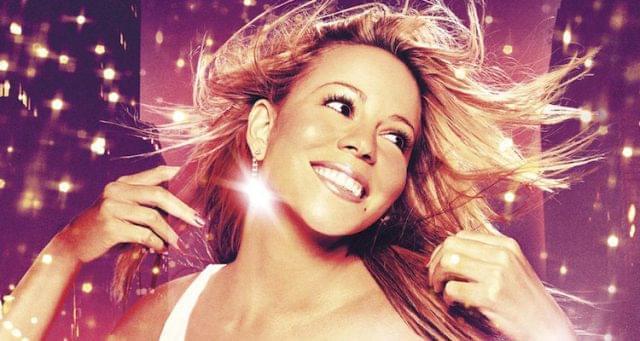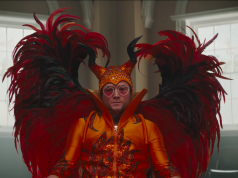
Mariah Carey is a lot of things. Famous, for example. That’s a thing she is. Another thing she is, is an Aries. There’s no disputing that. She was born March 27, so she’s an Aries. You can take that one to the bank!
Something Mariah Carey is not, however, is an actress. It would be foolhardy to give her the leading role in a motion picture, particularly if the role was one that required any show of emotion or charisma beyond what you could expect from, say, a handful of gravel, or an orange.
And yet somehow, early in the current millennium, a movie called “Glitter” appeared in theaters, with Mariah Carey as its star. No one is sure how it happened. There is no record of any humans being involved in the film’s production. None of the performers who appear in it have any memory of actually making it. The movie simply appeared one day, its origins mysterious, like Stonehenge.
Films like this are often called “vanity projects,” but nowhere has the term ever been more appropriate than here. “Glitter’s” central message is this: Mariah Carey is a great singer. Scene after scene features someone telling her — or her semi-autobiographical character, anyway — how beautiful her voice is, how beautiful SHE is, how talented she is, how fantastic it is to work with her. It’s not so much a movie as it is a therapy session.
It begins promisingly enough: We’re in a nightclub, and someone other than Mariah Carey is singing. You can tell it’s not her because none of the drink glasses have shattered, and the tables are not covered in the fluids from patrons’ ruptured eardrums. The singer is a boozy jazz chanteuse who turns out to be young Billie’s mother. (Billie = Mariah.) She invites her daughter onstage — she is the kind of mother who takes her 12-year-old daughter to smoky nightclubs — and Billie reluctantly, shyly approaches, hesitantly takes a microphone, looks tentatively at her mom … and then emits a piercing shriek that rises and falls roughly in time with the music, something I would have guessed was a type of tribal war chant but which turns out to be singing. The newly deafened audience greets her with rapturous applause, unaware that it is the last sound they will ever hear.
While the opening credits are still rolling, we breeze past the basics of Billie’s upbringing: absent father, alcoholic mother, and then foster care. Soon enough, Billie is grown up and dancing in hootchie clothes with her two hootchie friends (played by women called Tia Texada and “Da Brat”) at a hootchie dance club. Everyone is wearing leopard prints, because it is 1983, and that sort of thing was OK then. A man who dresses and acts like a pimp but who is actually a music producer — he is played by Terrence Howard, which adds to his seems-like-a-pimp-ness — approaches the three girls and asks if they’d like to be backup singers for his current top earner, an untalented skank named Sylk. Billie says no, they would not, and she is quite adamant about it. Then, after approximately 3.5 seconds of having mild pressure applied to her by her friends, she changes her mind. It is that type of steadfast commitment to her principles that will help Billie go far in this business.
As it turns out, Sylk is a terrible singer, and Pimp Guy knows it. On recordings and in live performances, he turns her vocal tracks way down and turns Billie’s way up. This trick only works if the backup singers and the lead vocalist are singing the exact same thing, so I guess that’s what they’re doing. It doesn’t matter, though: A dance club DJ named Dice (Max Beesley) notices that Billie is the real talent here, and he offers Pimp Guy $100,000 for her contract. Pimp Guy agrees to these terms and then lets Dice have her on credit, without so much as a down payment. He’ll never get that $100,000. Pimp Guy is a failure on many levels.
Billie’s rise to the top is sudden and unconvincing. Her first single — produced by Dice, who is now her boyfriend, too — spends 10 weeks at the top of the pop charts. Dice is a tooly New York guy who often wears his button-up shirts unbuttoned, and he, like the rest of the world, is in awe of Billie’s amazing talent and beauty. But he can also be jealous and possessive. Those times cause great sadness in Billie, which she manifests by slightly altering her facial expression from “vacant” to “what an imbecile thinks ‘sad’ looks like.” (Hint: It looks a lot like “vacant.”)
Meanwhile, the movie spends two or three minutes focusing on Billie’s halfhearted attempts to sort of find her mother, maybe, if it’s not too much trouble. I think we were supposed to get the impression that this was an issue of great importance to Billie — but as with Billie’s facial expressions, the difference between “something” and “nothing” in this movie is very slight. To me, she appears no more concerned about finding her mother than she does about what day it is or what the weather’s like in Nebraska.
Through all her travails, Billie remains un-diva-like and normal, always innocent and unassuming. It’s the people around her who are problematic and difficult, never saintly Mariah herself. When she’s appearing as the musical guest on “Saturday Night Live” (called “Late Night Live” here), and the show has begun and she’s just waiting for her spot, Billie gets the call that Dice has been arrested for assaulting Pimp Guy. She ditches the show to go bail him out. That’s devotion! That’s also stupid. She was 15 minutes away from performing on live TV. What, she couldn’t let Dice sit in jail an extra half-hour?
The film’s story is thin, a mere framework of a plot hung loosely around many, many, many scenes of Billie singing. I suppose if you’re a big fan of Mariah Carey’s unique vocal stylings, it might be a treat to watch her here. On the other hand, even if you like her particular brand of caterwauling, why torture yourself with 104 minutes of this banal drudgery? I would think you’d have suffered enough already.
— Film.com





